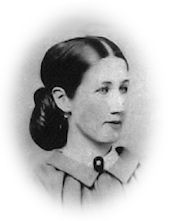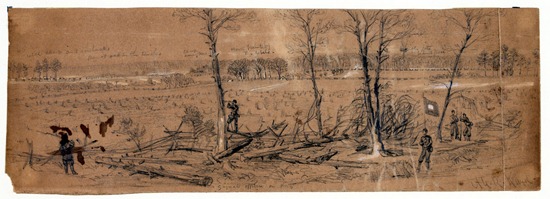 Harriet Roosevelt Woolsey to Georgeanna.
Harriet Roosevelt Woolsey to Georgeanna.
Ebbitt House, April 27.
Everybody was delighted with what you left in Washington for the hospitals. Some of the jellies and wine (I found a whole box of it left without orders), and some shoes, I took over to Georgetown to Mrs. Russell, who was just out of all. Mother is going about the room indignant still at the Bank, and “expects to have every policeman in the city tapping her on the shoulder to know the facts of the case.” We try not to miss you, but yesterday was very like Sunday, much more quiet and Sabbath-like than when you were here; to-day we have had the bank excitement to keep us busy.

The “bank excitement” is the little incident recounted in the Evening Star as follows:

A Cool Operation.—This morning, Mrs. C. W. Woolsey went to the Bank of the Metropolis to draw the money for two checks of a hundred dollars each. Unacquainted, apparently, with business of the sort, she stepped into the bank, and instead of applying at the counter, presented them to a person who was standing at a desk outside, and returned to her coach. This person presented the checks to the paying teller, who refused to pay because they lacked Mrs. Woolsey’s endorsement. He took a pen and went out to the coach and returned with the checks properly endorsed. They were paid, and the fellow made off with the money, leaving the lady minus.

The man had just the right business manner, not too polite—stepped out without his hat as if he had left his desk to oblige a lady. He was thanked for his courtesy, and left “right sudden” with the funds.

It was hardly fair in us to run Mother on this winding up of her triumphant career in Washington, which city, as she indignantly said, she “left, under the full recognition of several of the Metropolitan police!”
Newport, R. I, April 27,1862.
Dear A., — I am thinking of going to Yorktown. How should you view it? The Sanitary Commission has to-day sent off from Washington a large steamship to be fitted up as a hospital transport. Mrs. Griffin has gone down in her with Mr. Olmsted, and by his request. I have great confidence in her. She is a lady, whose presence is guarantee enough that I, or any other woman, may go there with propriety. She is very efficient, and I should be satisfied in working under her. In short, I have written to her to send for me if they want me; the letter went yesterday. I suppose this will rather startle you. But why should it not be done? My work here is closing. Colonel Vinton (Quartermaster-General in New York) sends me to-day the flannel for the last ten thousand shirts which close my present contract; I have just drained the community dry as to hospital supplies, and the churches have lately sent in $1,800 (making $5,500 which I have received since we began in April, 1861). A drawing together of circumstances seems to point to this thing, and I enter upon it as if it were obviously the next thing to be done.
I have said nothing about it to any one, nor shall I till I hear from the Commission. You must stand by me if the plan meets with disapproval here.
April 27th.—New Orleans gone¹ and with it the Confederacy. That Mississippi ruins us if lost. The Confederacy has been done to death by the politicians. What wonder we are lost.
The soldiers have done their duty. All honor to the army. Statesmen as busy as bees about their own places, or their personal honor, too busy to see the enemy at a distance. With a microscope they were examining their own interests, or their own wrongs, forgetting the interests of the people they represented. They were concocting newspaper paragraphs to injure the government. No matter how vital it may be, nothing can be kept from the enemy. They must publish themselves, night and day, what they are doing, or the omniscient Buncombe will forget them.
This fall of New Orleans means utter ruin to the private fortunes of the Prestons. Mr. Preston came from New Orleans so satisfied with Mansfield Lovell and the tremendous steam-rams he saw there. While in New Orleans Burnside offered Mr. Preston five hundred thousand dollars, a debt due to him from Burnside, and he refused to take it. He said the money was safer in Burnside’s hands than his. And so it may prove, so ugly is the outlook now. Burnside is wide awake; he is not a man to be caught napping.
Mary Preston was saying she had asked the Hamptons how they relished the idea of being paupers. If the country is saved none of us will care for that sort of thing. Philosophical and patriotic, Mr. Chesnut came in, saying: “Conrad has been telegraphed from New Orleans that the great iron-clad Louisiana went down at the first shot.” Mr. Chesnut and Mary Preston walked off, first to the bulletin-board and then to the Prestons’.

______
¹ New Orleans had been seized by the Confederates at the outbreak of the war. Steps to capture it were soon taken by the Federals and on April 18, 1862, the mortar flotilla, under Farragut, opened fire on its protecting forts. Making little impression on them, Farragut ran boldly past the forts and destroyed the Confederate fleet, comprising 13 gunboats and two ironclads. On April 27th he took formal possession of the city.
April 27.—The people of Franklin County, Mo., met and passed resolutions in support of the Emancipation Message of President Lincoln, and sustaining the measures of the National Government adopted for the prosecution of the war.—(Doc. 152.)
Mansfield Lovell, General late in command of the rebel forces at New-Orleans, La., telegraphed to Richmond as follows from Camp Moore, La.: — “Forts Jackson and St Philip are still in good condition, and in our hands. The steamers Louisiana and McRae are safe. The enemy’s fleet are at the city, (New-Orleans), but they have not forces enough to occupy it. The inhabitants are stanchly loyal.”
—Fort Livingston, La., was this day evacuated by the rebel forces.—National Intelligencer, May 10.
—Gen. Beauregard, at Memphis, Tennessee, issued the following address to the planters of the South:—”The casualties of war have opened the Mississippi to our enemies. The time has therefore come to test the earnestness of all classes, and I call upon all patriotic planters owning cotton in the possible reach of our enemies to apply the torch to it without delay or hesitation.”—Missouri Democrat.
—Purdy, Tennessee, was evacuated by the confederates.—Memphis Argus, April 29.

(click on image to view larger version)
Enemy’s works as viewed from a Federal position
Morgan collection of Civil War drawings (Library of Congress)
- Published as: The enemy’s works near Yorktown in Harper’s Weekly, May 3, 1862, pp. 280-1.
- Inscribed above image: Rebel camp and earthworks; Men at work in the trenches; Camp among trees; House burnt by the rebels; Rifle pits behind fence. Inscribed below image: signal officer on duty.
Library of Congress Prints and Photographs Catalog
This envelope and additional information may be found here at the Library of Congress
 Harriet Roosevelt Woolsey to Georgeanna.
Harriet Roosevelt Woolsey to Georgeanna.
![]()
![]()
![]()





